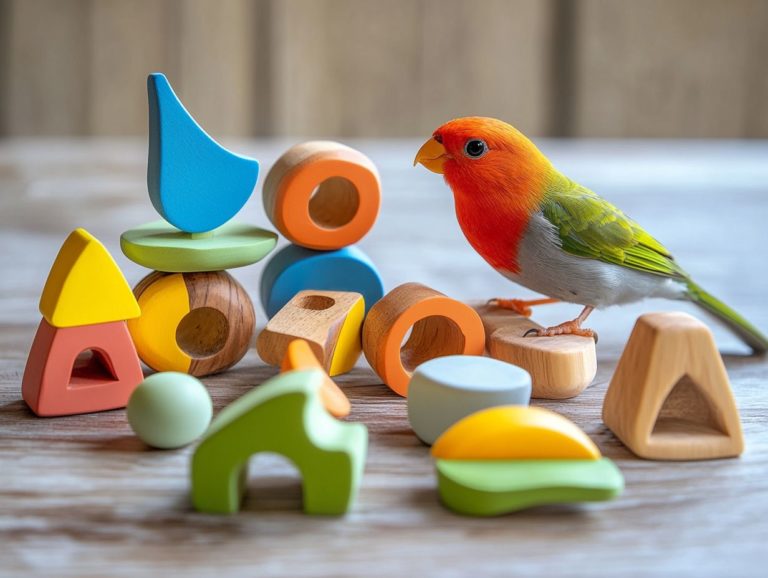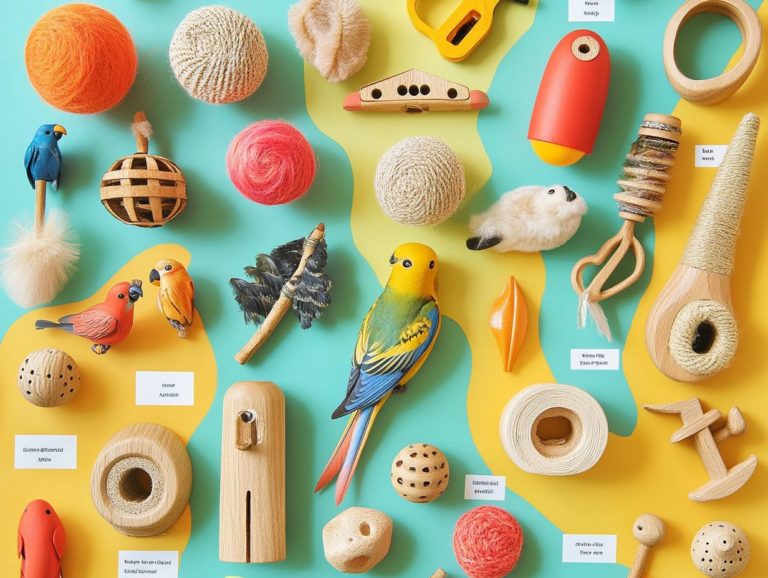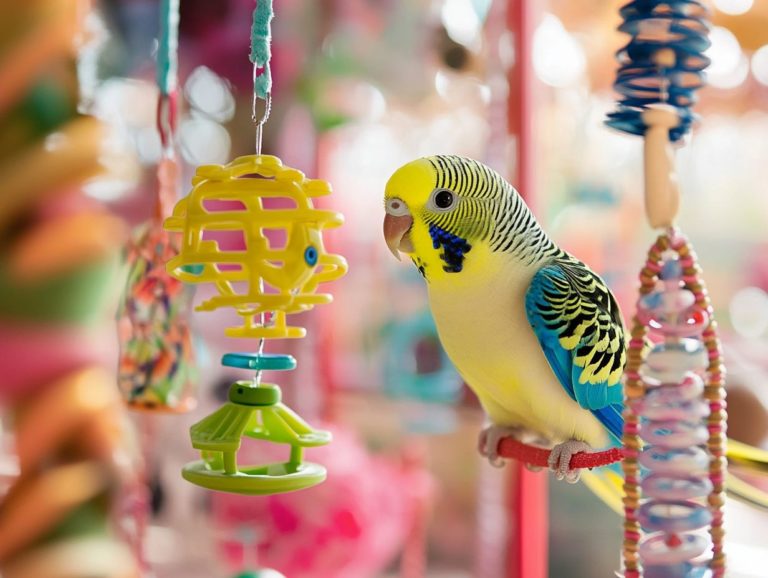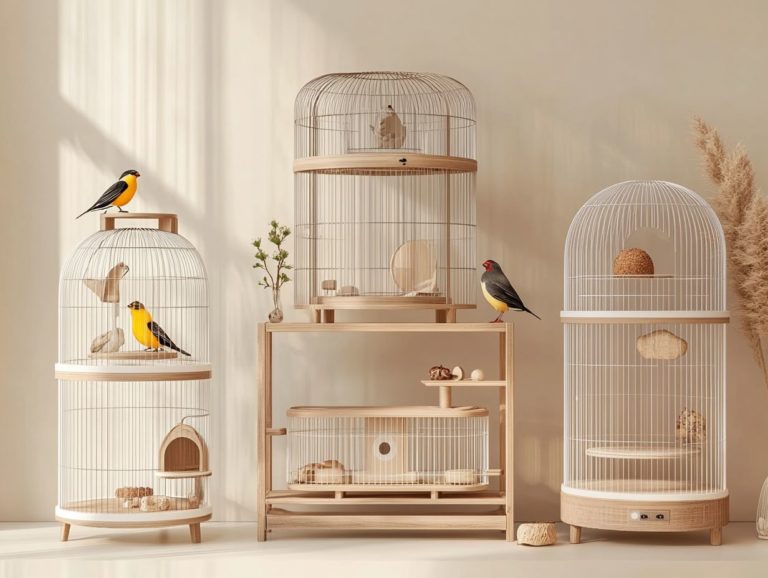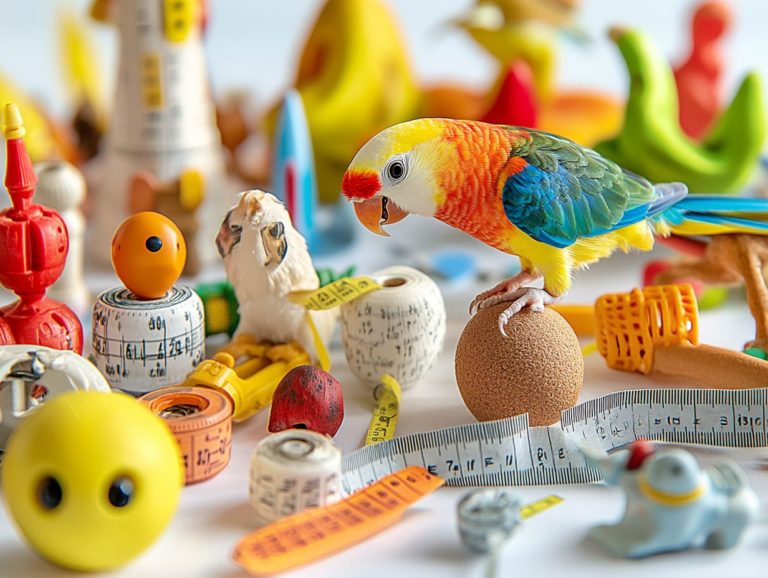The Best Accessories for Bird Health Monitoring
Caring for your feathered friends goes beyond providing food and shelter. It involves a vigilant approach to monitoring their health and overall well-being.
This article explores the best accessories that help you keep a close eye on your bird’s health. From smart feeders that track feeding habits to advanced systems that check air quality and temperature, these tools offer valuable insights for any bird owner.
Discover how each accessory can help in the early detection of health issues and contribute to preventative care, ensuring your bird enjoys a happy, healthy life.
Immerse yourself in this guide to find which tools might be the perfect fit for you and your avian companion.
Contents
- Key Takeaways:
- The Best Accessories for Bird Health Monitoring
- 1. Smart Bird Feeders
- 2. Activity Trackers
- 3. Temperature and Humidity Sensors
- 4. Bird Bath Water Quality Monitors
- 5. Air Quality Monitors
- 6. GPS Trackers
- 7. Noise Monitors
- 8. Heart Rate Monitors
- 9. Feather Health Sensors
- 10. Nesting Box Cameras
- 11. Perch Sensors
- 12. UV Light Sensors
- 13. Bird Identification Apps
- 14. Weather Forecasting Tools
- 15. Remote Monitoring Systems
- What Are the Key Features to Look for in Bird Health Monitoring Accessories?
- How Can These Accessories Help with Early Detection of Health Issues?
- How Can They Help with Preventative Care for Birds?
- What Are the Potential Drawbacks of Using These Accessories?
- What Are Some Tips for Choosing the Right Accessories for Your Bird?
- Frequently Asked Questions
- What are the best accessories for bird health monitoring?
- How do digital scales help with bird health monitoring?
- What are leg bands and how do they assist with bird health monitoring?
- Why Are Field Guides Important for Bird Health Monitoring?
- How Can Binoculars Enhance Bird Health Monitoring?
- Why Is a Spotting Scope Useful for Bird Health Monitoring?
Key Takeaways:
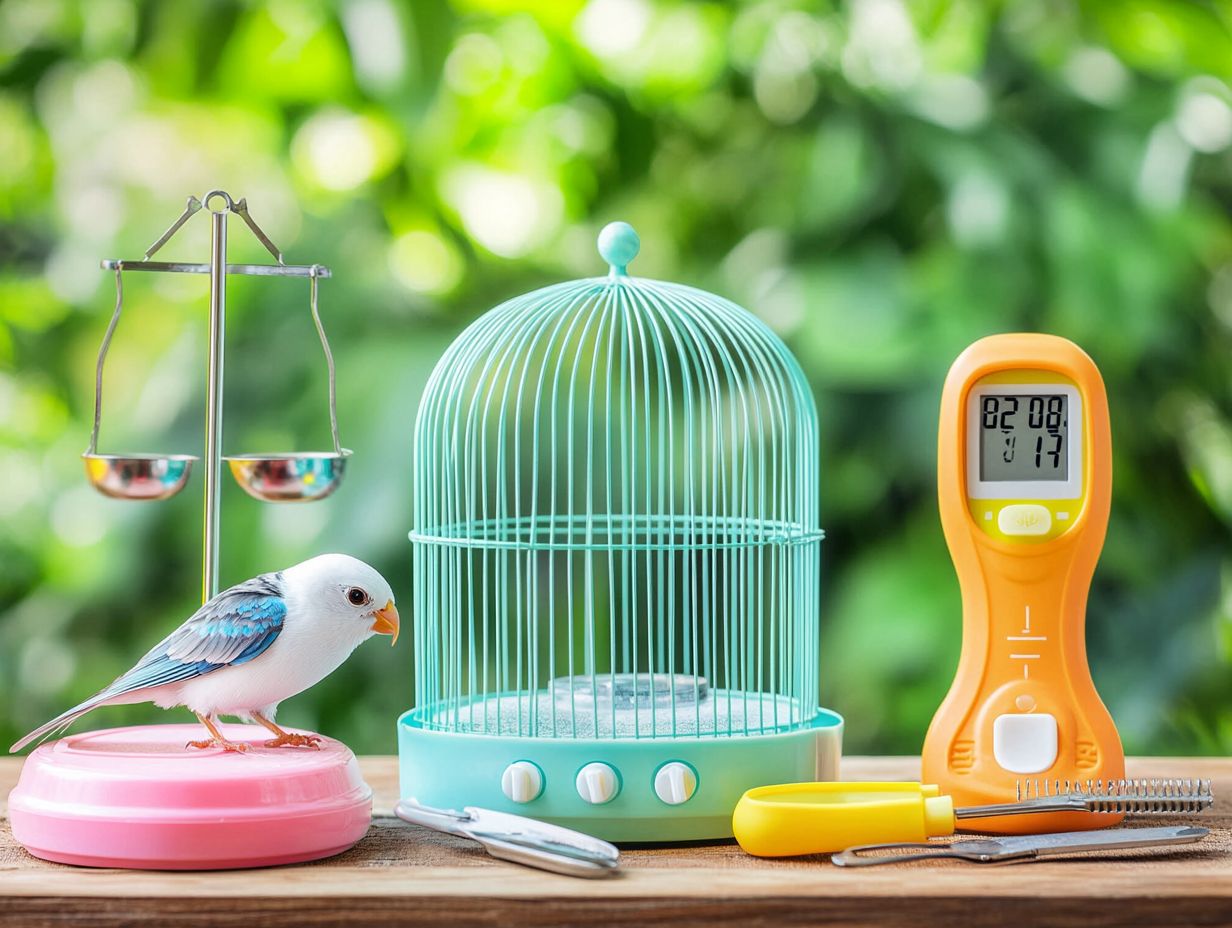
- Smart bird feeders and activity trackers help monitor diet and exercise for a healthier bird.
- Temperature, humidity, and air quality sensors alert owners to potential environmental hazards.
- GPS trackers and nest box cameras assist in observing bird behavior and detecting early signs of illness.
The Best Accessories for Bird Health Monitoring
In the world of animal monitoring systems, bird health monitoring has become essential, especially with innovative accessories designed to enhance avian well-being and improve your understanding of their behavior.
These accessories not only cater to your birds’ immediate needs but also provide a wealth of data to help you understand them better. Imagine smart bird feeders with weight sensors and food tracking that notify you when your birds are eating well or if any changes occur clues that could reveal potential health issues.
Temperature sensors monitor cage conditions, alerting you when adjustments are necessary to maintain optimal warmth for species like budgerigars and canaries. By using these advanced solutions, you can ensure your pets thrive while gaining insights into their habits and preferences, enriching your companionship experience.
1. Smart Bird Feeders
Smart bird feeders are transforming your bird-watching experience by using technology that tracks feeding habits and promotes bird health monitoring.
These state-of-the-art feeders come with advanced sensors that record how often various bird species visit and provide valuable insights into the types of food they consume. With a connection to mobile apps, you can access real-time data, allowing you to monitor feeding patterns and adjust offerings for optimal nutritional value tailored to different birds.
This ensures you provide the best possible diet, contributing to healthier and happier avian visitors. Plus, many designs feature weather-resistant materials, making them reliable year-round.
2. Activity Trackers
Activity trackers designed for birds are a game-changer! They offer crucial insights into movement patterns, enhancing your ability to monitor avian health.
These trackers are essential for spotting abnormalities in activity levels, which could signal underlying health issues. With advancements in lightweight technology, these devices fit comfortably on birds, allowing for continuous monitoring that aligns with their natural behaviors.
Features like GPS tracking and heart rate monitoring gather comprehensive data, making it easier to detect potential problems early on. The information collected can guide you in adjusting diets and environments, ultimately supporting the long-term health and well-being of your avian companions.
With this technology at your fingertips, both bird enthusiasts and researchers can work together to nurture healthier bird populations.
Now, it’s time to explore the accessories that best suit your needs. Which tools are you excited to try? Share your experiences with bird health monitoring accessories!
3. Temperature and Humidity Sensors
Temperature and humidity sensors are important tools for maintaining optimal living conditions for birds, crucial for their overall health and well-being.
By continuously monitoring these factors, sensors provide invaluable insights into habitat conditions, allowing for timely adjustments. This real-time data helps you see how changes in temperature and humidity affect the birds behavior and physiological health.
For instance, a sudden spike in humidity could signal a risk for respiratory issues. This prompts preventive measures before any adverse effects occur. Understanding temperature variations helps create a comfortable environment, ensuring the birds stay active, stress-free, and healthy.
Thorough monitoring enables proactive health management strategies, enhancing the overall quality of life for your avian residents.
4. Bird Bath Water Quality Monitors
Bird bath water quality monitors ensure that the water provided for birds remains clean and safe, which is essential for their hydration and well-being.
By regularly checking key parameters like pH levels, cloudiness (the cloudiness of water caused by particles), and microbial contamination, these devices protect avian populations. Clean water aids birds in daily activities and helps them thrive in their natural settings.
When water quality falters, birds become more vulnerable to diseases linked to contaminated water consumption. By maintaining pure and healthy water sources, you significantly contribute to the well-being of these remarkable creatures, allowing them to display their vibrant plumage and sustain lively behaviors in the wild.
5. Air Quality Monitors
Air quality monitors are key tools for evaluating environmental conditions affecting bird health, allowing timely interventions.
These sophisticated devices detect a range of pollutants in the atmosphere, such as particulate matter, nitrogen dioxide, and harmful chemicals that affect air quality. By measuring these substances, they provide invaluable insights into air quality that influences avian species and their habitats.
Poor air quality can lead to respiratory problems, disrupt foraging behaviors, and alter migration patterns among birds. Recognizing these environmental factors is crucial to protect our birds now!
Understanding air quality plays a key role in your conservation efforts and helps ensure the long-term survival of species in habitats threatened by pollution.
6. GPS Trackers
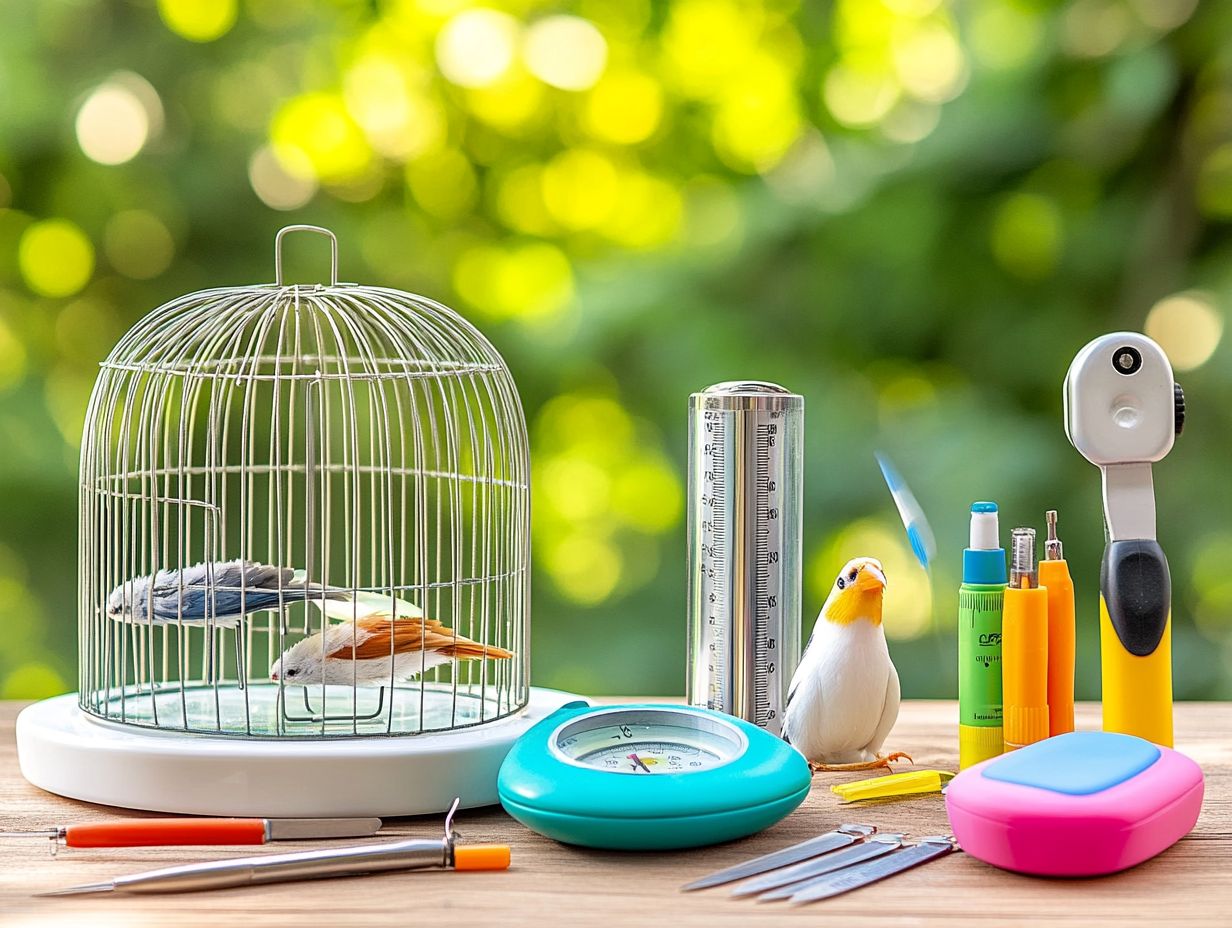
GPS trackers allow bird owners and researchers to monitor birds’ movements in real-time, offering insights into their habits and overall health.
These devices help you understand avian behavior, migration patterns, and habitat use, assisting in creating better conservation strategies. For pet owners, GPS trackers provide a reliable safety net, ensuring lost pets can be found and returned home swiftly.
In wildlife conservation, these trackers gather vital data on animal movements, helping scientists identify the needs and threats faced by endangered species. With their innovative applications, GPS technology enhances pet care and significantly impacts global wildlife preservation efforts.
7. Noise Monitors
Noise monitors are essential for assessing the sounds birds encounter. They significantly influence bird behavior and health.
By tracking sounds like traffic noise and construction, these monitors provide crucial insights. Research shows that high noise levels can stress birds and hinder their ability to communicate and reproduce.
Understanding these dynamics helps wildlife conservationists manage habitats effectively. This ensures birds thrive in quieter, natural settings.
8. Heart Rate Monitors
Heart rate monitors give valuable insights into a bird’s health. They help in proactive health management.
These amazing devices use advanced technology to track subtle changes in pulse rates. Analyzing this data can reveal stress or health issues early on.
The benefits extend beyond domestic birds; they are invaluable in rehabilitation centers and conservation programs. Early detection of heart rate anomalies allows for timely medical intervention.
Ultimately, this contributes to the overall well-being and longevity of your feathered companions!
9. Feather Health Sensors
Feather health sensors are groundbreaking tools that evaluate the condition of a bird’s feathers. They offer critical insights into its overall health.
These devices use cutting-edge technology to analyze feather structure, pigmentation, and wear. By identifying issues like stress or nutritional deficiencies, they provide invaluable information for avian caretakers.
Monitoring feather health goes beyond looks; it plays a vital role in understanding a bird’s well-being. This can lead to timely interventions!
Using data from these sensors enhances management practices and supports species conservation.
10. Nesting Box Cameras
Nesting box cameras offer a remarkable opportunity to observe birds discreetly during their breeding cycle. You gain valuable insights into their reproductive health.
These tools enable real-time monitoring of nesting behaviors. You can witness the delicate nuances of courtship, egg-laying, and incubation without intruding.
By capturing high-resolution footage, you can evaluate the overall well-being of hatchlings. This helps identify any signs of distress or health issues early on.
You can also document and analyze feeding patterns or parental care to deepen your understanding of avian life. This contributes to greater awareness of environmental issues!
11. Perch Sensors
Perch sensors are cutting-edge devices designed to monitor bird activity levels and time spent on perches. They offer valuable insights into their health and behavior.
These technologies use pressure sensitivity and motion detection to capture the subtleties of avian life. Whether you re a researcher or a bird enthusiast, you gain a deeper understanding of species interactions with their environments.
By recording data on perch usage, these sensors reveal patterns in rest and activity. This allows for assessments of stress, dietary habits, and overall well-being.
Such insights are crucial for conservation efforts. They help identify habitat preferences and critical feeding times, contributing to effective management strategies for various bird populations!
12. UV Light Sensors
UV light sensors are essential for ensuring that birds receive the right levels of natural light, which is crucial for their physical health and behavioral patterns.
These sensors replicate the natural environment that birds encounter in the wild, where sunlight is abundant in UV rays. By accurately measuring UV light, they help regulate the birds’ circadian rhythms, the natural sleep-wake cycle of birds, influencing vital aspects such as sleeping, feeding, and breeding behaviors.
Adequate exposure to UV light is crucial for calcium metabolism and feather health, which in turn supports robust immune systems. Thoughtfully implementing these sensors can significantly enhance the well-being of avian species, fostering healthier and more vibrant birds that truly thrive in their habitats.
13. Bird Identification Apps
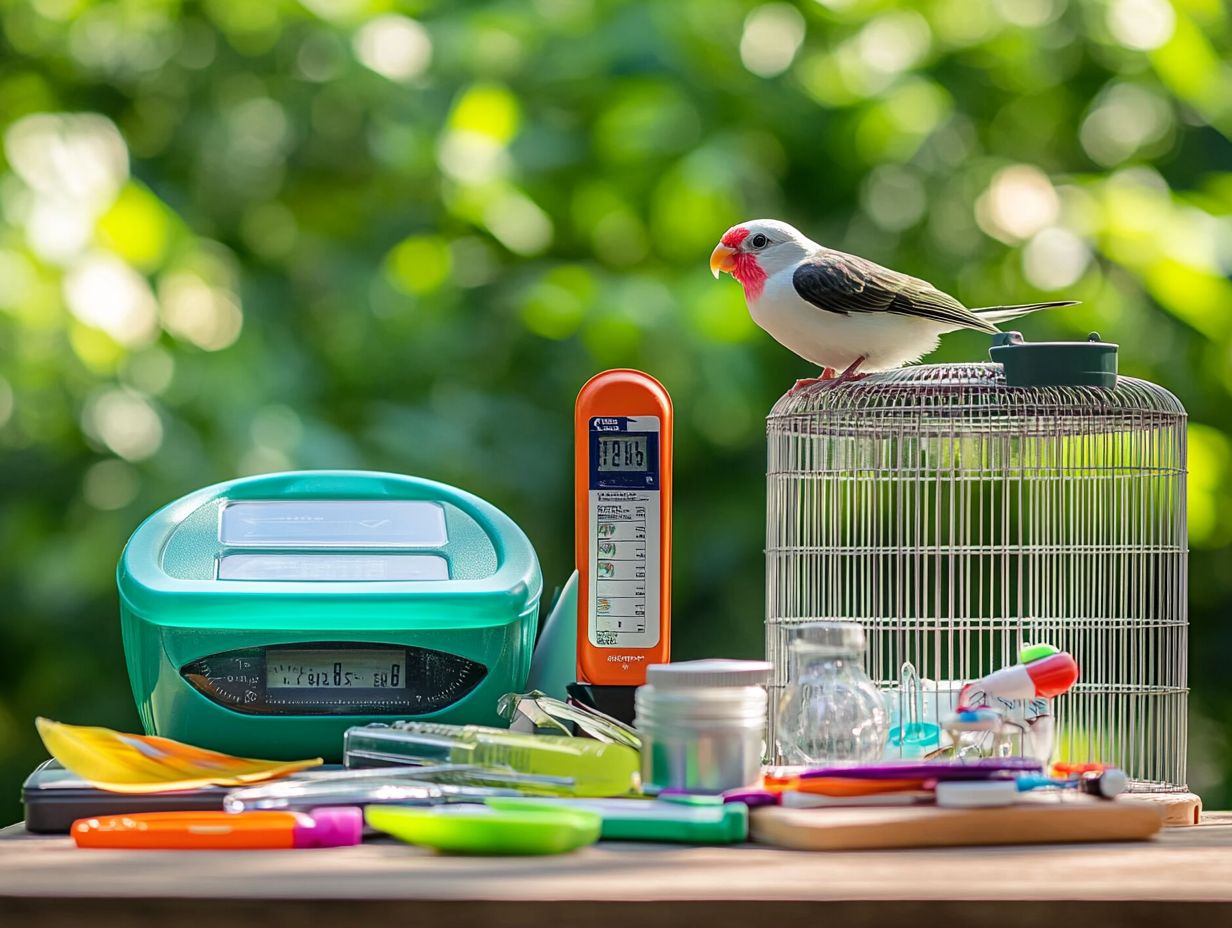
Bird identification apps elevate your bird-watching experience while playing an essential role in monitoring bird populations and their health.
These innovative tools enable you to recognize various species through captivating photos and sounds, allowing you to log your sightings in real-time. By facilitating user-generated data collection, these apps are pivotal in citizen science initiatives, enabling you to contribute meaningfully to broader avian health studies.
Access valuable information on species distribution and conservation statuses, enhancing your understanding of local ecosystems. In this way, these applications cultivate a community of informed birders who share a deep passion for protecting and comprehending the avian world.
14. Weather Forecasting Tools
Weather forecasting tools are essential for bird owners, enabling you to anticipate environmental changes that can influence your birds’ behavior and health.
Use these tools to quickly see upcoming weather changes, such as storms, extreme temperatures, and humidity fluctuations. This information is invaluable, allowing you to adjust your care routines accordingly.
For example, when sudden temperature drops occur, take the necessary precautions to keep your birds warm and secure. Similarly, impending storms may prompt you to reinforce outdoor enclosures or relocate indoor birds to safer spaces.
Ultimately, staying informed about weather patterns enables you to make proactive decisions, greatly enhancing the overall well-being of your feathered companions.
15. Remote Monitoring Systems
Take charge of your birds’ health and well-being with proactive monitoring! Remote monitoring systems offer you a comprehensive approach to bird health monitoring, enabling you to track multiple health metrics in real-time.
These cutting-edge systems not only facilitate the collection of vital data concerning activity levels, feeding habits, and vocalizations, but they also utilize smart data analysis to interpret this information with precision.
By integrating temperature, humidity, and various environmental factors into their assessments, they help you identify patterns that may signal early signs of health issues. With the ability to proactively manage bird health through continuous monitoring, you are equipped with the necessary tools to respond swiftly to any emerging concerns.
This ultimately enhances the well-being and longevity of your avian companions. Embracing this proactive approach is essential in fostering a healthier ecosystem for these remarkable creatures.
What Are the Key Features to Look for in Bird Health Monitoring Accessories?
When you re selecting bird health monitoring accessories, it s crucial to keep an eye on features like data accuracy, ease of use, and compatibility with other technologies.
Imagine the convenience of compatibility with smart home systems, which can significantly enhance your overall experience. This integration allows for seamless data tracking and control from a central hub, making your life much simpler.
A user-friendly interface is equally important; it enables you to interpret health metrics quickly, without needing a tech degree. This not only makes it more accessible for bird owners like you but also encourages regular use, fostering a deeper awareness of your pet s well-being.
With features like real-time alerts and mobile app connectivity, you gain peace of mind, ensuring that any concerns are addressed as soon as they arise. Equip your home with these must-have accessories for the best bird care!
How Can These Accessories Help with Early Detection of Health Issues?
Bird health monitoring accessories are essential for early detection of health issues. They enable you to respond proactively to potential problems.
These accessories ranging from specialized cages and dietary supplements to electronic devices that monitor your bird’s activity and health offer invaluable insights into your bird’s physical state. For example, shifts in activity levels or variations in weight can signal underlying health conditions.
By recognizing these signs early on, you can promptly seek veterinary care, ensuring that your feathered companion receives the necessary intervention before minor issues escalate into serious concerns.
This proactive approach not only enhances your bird s quality of life but also deepens the bond between you and your avian friend.
How Can They Help with Preventative Care for Birds?
Preventative care for your birds can reach new heights with the right health monitoring accessories. These devices provide valuable data that enables you to make informed decisions about their care.
Utilizing insights from these innovative tools helps you spot early signs of health issues and adjust their diet or environment to better suit your feathered companions. For example, tracking activity levels can highlight behavioral changes that may signal stress or illness, allowing you to take action promptly.
Monitoring devices also promote responsible breeding practices by delivering essential statistics on genetic health. This proactive approach enhances your understanding of avian well-being, enabling you to nurture happier, healthier birds.
What Are the Potential Drawbacks of Using These Accessories?
While bird health monitoring accessories present a wealth of benefits, considering potential drawbacks is crucial! One significant concern is the cost; these advanced tools can be pricey, which might limit access for smaller bird sanctuaries or private owners.
You may also find that the complexity of these tools can be a hurdle, particularly if you’re not tech-savvy. If not used correctly, ineffective monitoring could become a real issue. Plus, there’s always that reliance on technology, which can create gaps in data if devices fail or malfunction.
Here are some effective strategies to overcome these challenges:
- Look for budget-friendly options,
- Invest in user-friendly systems with plenty of training resources, or
- Establish a regular maintenance schedule for your technology to ensure it performs consistently.
What Are Some Tips for Choosing the Right Accessories for Your Bird?
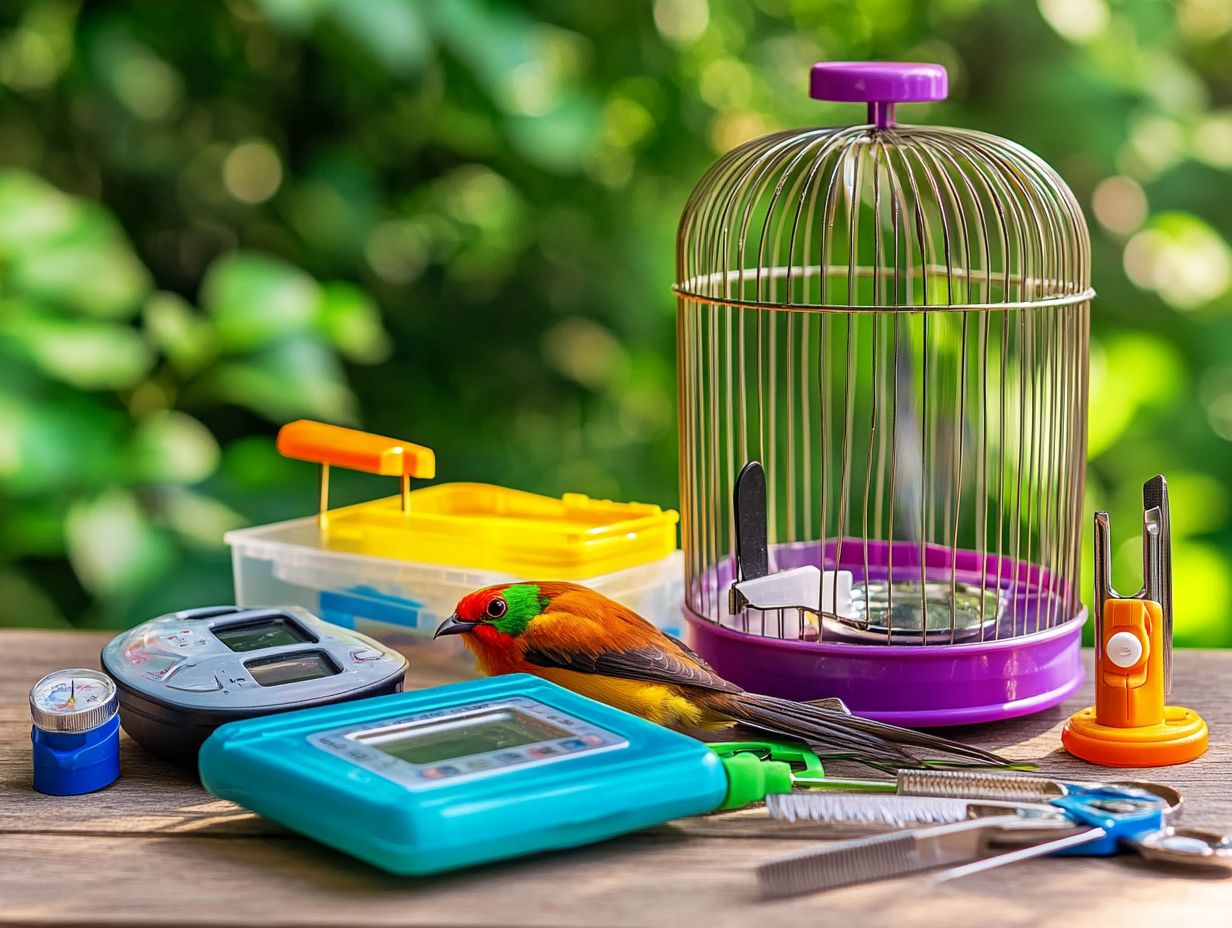
Choosing the right accessories for monitoring your bird’s health requires thoughtful consideration of its unique needs and the features of the available technologies, as outlined in understanding the role of accessories in bird care.
Begin by assessing the species of the bird you are monitoring. Different species have distinct requirements when it comes to diet, habitat, and behavior, so understanding these nuances is essential for selecting the most appropriate tools.
Next, evaluate the habitat conditions where monitoring will occur; ensure the accessories you choose are suitable for both indoor and outdoor environments.
Finally, determine the intensity of the monitoring process you envision. If you re looking for casual observation, simpler tools might do the trick, but more detailed studies will demand advanced equipment capable of tracking specific health metrics over time.
Frequently Asked Questions
Curious about bird health monitoring? Here are some of the most common questions!
What are the best accessories for bird health monitoring?
The best accessories for bird health monitoring include digital scales, leg bands, field guides, binoculars, spotting scopes, and a camera.
How do digital scales help with bird health monitoring?
Digital scales provide accurate weight measurements that can help track a bird’s health and detect any changes that may indicate illness or injury.
What are leg bands and how do they assist with bird health monitoring?
Leg bands are small, lightweight, and numbered bands that are placed around a bird’s leg. These bands help identify individual birds and can provide important data for tracking their health and behavior.
Why Are Field Guides Important for Bird Health Monitoring?
Field guides offer helpful details about various bird species. They cover their habitats and behaviors, which helps bird owners spot health issues.
How Can Binoculars Enhance Bird Health Monitoring?
Binoculars let you see birds up close in their natural surroundings. This helps you observe their health and behavior accurately without causing stress.
Why Is a Spotting Scope Useful for Bird Health Monitoring?
A spotting scope provides a detailed view of distant birds. It is perfect for monitoring species in hard-to-reach areas.

